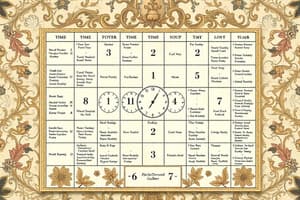Podcast
Questions and Answers
What is the primary focus of organizational skills in the context of CHW (Community Health Worker) essentials?
What is the primary focus of organizational skills in the context of CHW (Community Health Worker) essentials?
- Managing personal finances
- Optimizing time and resources for efficient work (correct)
- Enhancing communication skills
- Improving physical health
Which of the following strategies is part of 'Ready, Fire, Aim' approach to time management?
Which of the following strategies is part of 'Ready, Fire, Aim' approach to time management?
- Taking action and adjusting plans based on new information (correct)
- Ignoring the 80/20 rule
- Avoiding action until all information is available
- Over-planning each action
The 'Chunk, Block, Tackle' method suggests focusing on the entire project at once to increase efficiency.
The 'Chunk, Block, Tackle' method suggests focusing on the entire project at once to increase efficiency.
False (B)
Match the '4 D's' of workflow with their actions when dealing with emails:
Match the '4 D's' of workflow with their actions when dealing with emails:
According to the presentation, the best way to use a calendar is to list all possible tasks, regardless of their importance or deadlines.
According to the presentation, the best way to use a calendar is to list all possible tasks, regardless of their importance or deadlines.
Delegating a task means avoiding it altogether instead of finding someone more capable to fulfill said task.
Delegating a task means avoiding it altogether instead of finding someone more capable to fulfill said task.
According to the 'Eat That Frog' approach, what kind of task should you tackle first?
According to the 'Eat That Frog' approach, what kind of task should you tackle first?
Which activity would constitute a 'pebble' in the glass jar model?
Which activity would constitute a 'pebble' in the glass jar model?
Effective e-mail habits include always responding to everything immediately.
Effective e-mail habits include always responding to everything immediately.
Which routine is advocated to improve organizatonal skills?
Which routine is advocated to improve organizatonal skills?
Flashcards
80/20 Rule (Pareto Principle)
80/20 Rule (Pareto Principle)
The principle stating 80% of results come from 20% of efforts.
Urgent Important Matrix
Urgent Important Matrix
A method for prioritizing tasks by urgency and importance.
Productivity Journaling
Productivity Journaling
A daily practice of recording tasks, priorities, and reflections.
The Glass Jar
The Glass Jar
Signup and view all the flashcards
Chunking
Chunking
Signup and view all the flashcards
Block
Block
Signup and view all the flashcards
Tackle
Tackle
Signup and view all the flashcards
Ready, Fire, Aim
Ready, Fire, Aim
Signup and view all the flashcards
Prioritizing Time
Prioritizing Time
Signup and view all the flashcards
Delete it
Delete it
Signup and view all the flashcards
Delegate it
Delegate it
Signup and view all the flashcards
Do it Now
Do it Now
Signup and view all the flashcards
Ask for advice
Ask for advice
Signup and view all the flashcards
Chop it Up
Chop it Up
Signup and view all the flashcards
Obey the 15 Minute Rule
Obey the 15 Minute Rule
Signup and view all the flashcards
Have Clear Deadlines
Have Clear Deadlines
Signup and view all the flashcards
Give Yourself a Reward
Give Yourself a Reward
Signup and view all the flashcards
Remove Distractions
Remove Distractions
Signup and view all the flashcards
Eat That Frog!
Eat That Frog!
Signup and view all the flashcards
Organizing Your Workspace
Organizing Your Workspace
Signup and view all the flashcards
Declutter
Declutter
Signup and view all the flashcards
The Four D's
The Four D's
Signup and view all the flashcards
S.T.I.N.G.
S.T.I.N.G.
Signup and view all the flashcards
Dealing with Emails
Dealing with Emails
Signup and view all the flashcards
Using Calendars
Using Calendars
Signup and view all the flashcards
Setting A Ritual
Setting A Ritual
Signup and view all the flashcards
Ritual definition
Ritual definition
Signup and view all the flashcards
Essential Rituals
Essential Rituals
Signup and view all the flashcards
Study Notes
- This presentation is part of a curriculum and all content is the intellectual property of Umemba Health LLC.
- The learning objectives are to understand how to plan and prioritize daily activities more efficiently, identify ways to overcome procrastination, organize workspace and workflow, and to utilize rituals to make life run smoother.
- The agenda includes time management and prioritization, procrastination, workspace organization, rituals, a prioritized to-do list activity, and floor announcements.
Prioritizing Time
- What is important is rarely urgent, and what is urgent is rarely important, according to Dwight Eisenhower.
- The 80/20 rule (Pareto's Principle) states that 80% of results come from 20% of actions.
- Eisenhower Matrix is a matrix using the parameters Urgent / Not Urgent and Important / Not Important to prioritise tasks
- If the task is marked as Urgent and Important you DO it straight away
- If the task is marked as Not Urgent and Important you PLAN when to do it
- If the task is marked as Urgent and Not Important, you DELEGATE it to someone else
- If the task is marked as Not Urgent and Not Important, you ELIMINATE it
- Productivity Journaling includes labeling each page with the day and date, writing what needs to be done that day, prioritizing each task, highlighting the top three items to focus on, crossing off items when completed, and carrying over incomplete items to the next page.
- The Glass Jar metaphor refers to time management and prioritizing tasks using Rocks (Important, not urgent), Pebbles (Urgent and important), Sand (Urgent, but not important), and Water (Neither important, nor urgent).
- Chunking involves breaking projects into specific tasks that can be completed in less than 15 minutes.
- Blocking is setting aside set times to complete specific chunks.
- Tackling is focusing on a specific task rather than the project as a whole.
- When prioritizing time, you should be ready to take action and don't over-plan. When you get going, follow the 80/20 rule. Finally, make new plans based on new information.
Tackling Procrastination
- To overcome procrastination you can:
- Delete it.
- Delegate it.
- Do it now.
- Ask for advice.
- Chop it up.
- Obey the 15-minute rule.
- Have clear deadlines.
- Give yourself a reward.
- Remove distractions.
- "Eat that frog" concept means your "frog" is the task that will have the greatest impact on achieving your goals and is most likely to be procrastinated.
Organizing Your Workspace
- To retrieve materials quickly, you'll need an effective filing system including three basic kinds of files:
- Working files: Materials used frequently and needed close at hand.
- Reference files: Information needed only occasionally.
- Archival files: Materials seldom retrieved but that must be kept.
- With emails you can follow these 4 D's:
- Delete emails that either don't apply, don't interest or don't require any further action
- Do it straight away as long as the email can be responded to or actioned in under 5 minutes
- Delegate emails that can be handled by someone else or to a folder for future reference.
- Defer email if it needs thought or time, mindfully wait and create a flag for your future self
- S.T.I.N.G is a method for preventing being overwhelmed by a task:
- Select one task
- Time yourself
- Ignore everything
- No breaks
- Give yourself a reward when you complete the task
- Emails handled in batches at regularly scheduled times of day, and E-mail contacts to use specific subject lines.
- Open and read urgent e-mails, and respond accordingly, by using folder for different topic/projects, by senders depending on email programs to automatically move folder.
- Delete e-mail from trash can and junk folder on a regular basis.
- Calendars are used to organize reminders into a small number of calendars and lists, by areas of responsibility .
- People with multiple responsibilities, use an annual calendar organized by areas of responsibility and list the major responsibilities month by month by using the productivity journal.
Setting a Ritual
- A ritual is any practice or pattern of behavior regularly performed in a set manner, with three steps: identify the task, time/trigger, and sub-tasks.
- Three items essential to ritualize are sleep, meals, and exercise.
- Using rituals:
- During a break at work or at home, read for ten minutes.
- Take one minute to do some deep breathing and stretches.
- Take five minutes to clean off your desk or some other small area.
- Take ten minutes to update your Personal Productivity Journal.
- Set aside one lunch hour a week to do personal errands
- Make a list at the beginning of each week and do one a day.
Studying That Suits You
Use AI to generate personalized quizzes and flashcards to suit your learning preferences.




